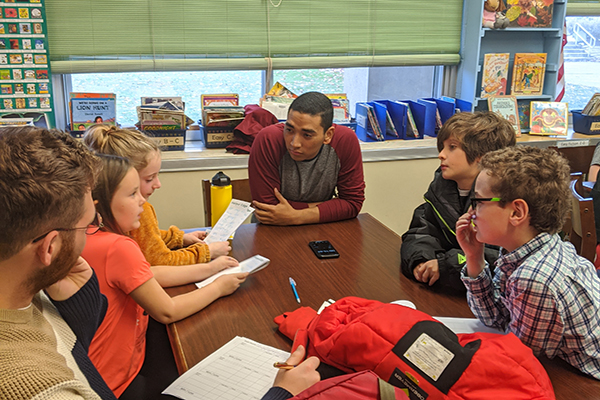Debate Team takes workshops virtual for local youths

Binghamton University students are holding a series of free virtual debate workshops for youths in Broome County in grades three through eight. The hour-long workshops start with general tips on how to formulate an argument and debate effectively, and then students are divided into teams, given a topic and work with a college student for five to 10 minutes, thinking about how they want to make their argument, before debating another team. The debates are judged by the college students, who provide feedback and advice for improvement. The process is repeated four times and then there is a final debate between the two top-ranked teams.
Joe Schatz, director of speech and debate at Binghamton University and a lecturer in the English Department, has been holding these debate workshops in local elementary and middle schools for four years, starting at African Road Elementary in Vestal, where his son was a student, and recently expanding to Horace Mann Elementary School, Benjamin Franklin Elementary School and West Middle School in Binghamton.
With the closing of local schools and Binghamton University’s move to online learning this spring, Schatz knew he would have to get creative to continue the workshops. He found that Zoom, the online video conferencing platform used by the University for remote learning and working, offered the perfect platform, with the ability to create virtual breakout sessions and bring local youths and college students who have moved back home together, face-to-face.
The college-student participants include members of the University’s award-winning debate team and students in Schatz’s argument and theory class.
“I think that one of the best ways to learn is to actually teach,” said Schatz. “A lot of the things that we teach the elementary school students are the same sort of lesson plans that I deal with for the college students. It helps them internalize the lessons that I’m giving them when they then have to teach it to somebody else.”
Schatz said he sees the value of debate as helping people become better critical thinkers and listeners, especially in a time of increasing streams of misinformation available to media consumers of all ages.
“The sooner that kids are taught how to argue and critically think about things, they become better suited to becoming engaged and informed members of the community. So no matter what we’re talking about — whether it’s school policies, city policy, federal policy — being able to actually understand what the other side is saying, look at those warrants, and compare and analyze what’s true and what’s not is an invaluable skill.”
In addition to strengthening his own students’ debate skills, Schatz said they learn about the importance of civic engagement.
“I also think it gives them something unique to say on their résumés moving forward, that they helped promote education and civic engagement in the local community.”
Thirteen-year-old Alexandra Yarosh, a student at Vestal Middle School, participated in the first virtual workshop on April 15 and says she really enjoyed the experience and interacting with the college students. “I learned to be attentive and carefully listen to what others are saying so I can respond adequately,” she said.
Schatz and his students will be running the workshops weekly on Wednesdays through May 6. If interest from the community warrants it, he may expand the program, offering more workshops throughout the week. He also hopes to run an international online debate tournament this summer that would engage elementary, middle and high school students around the world.
Parents can register their students for the upcoming Zoom workshops online.
